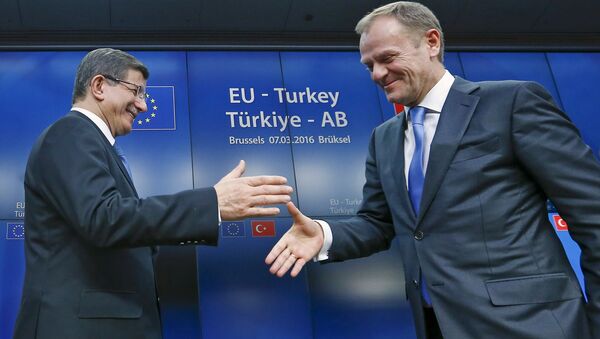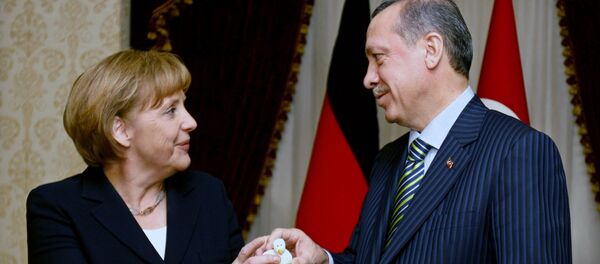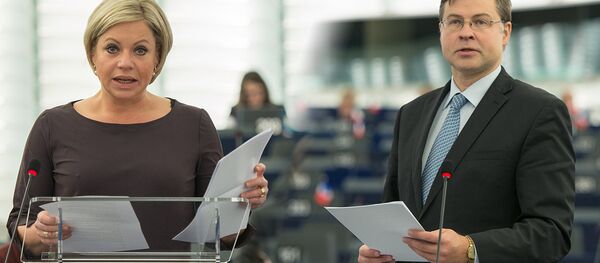Last Monday, the EU-Turkey summit resulted in the outline of an agreement aimed at stemming the flow of illegal immigrants from the Middle East to the EU via Turkey. The deal envisions €3 billion in EU assistance (with Ankara now demanding that this be upped €6 billion), faster implementation of a visa-free regime with the bloc, and the acceleration of talks on Turkey's prospects for joining the EU. In exchange, Ankara has pledged to take back all undocumented migrants entering the bloc through Turkey, swapping them on a one-for-one basis for legal Syrian refugees.
The draft agreement has been severely criticized by a wide variety of European commentators and lawmakers, who have broadly suggested that it is a case of Ankara 'blackmailing' Europe.
It also happens that, for a number of reasons, Turkish opposition parties of all stripes aren't so happy about the tentative deal either.
Speaking to Radio Sputnik Turkey, Ozkan Yalim, an MP from the Republican People's Party (the Turkish parliament's largest opposition party), suggested that the proposed agreement is one-sided in the EU's favor.
"On the whole, the summit can be called an operation by the EU to return refugees who have spread across Europe to Turkey," the politician noted. "Those fragmentary 'concessions' which the EU agreed to in the negotiations clearly demonstrate this. At a time when Turkey is experiencing a major unemployment crisis…spending on refugees on Turkish territory continues to grow. Figures for 2015 showed this figure to amount to $10.5 billion. Even if we assume that this figure will not increase greatly in 2016, it is still a very heavy burden for the country's budget."
"Unfortunately, while the [ruling] Justice and Development Party (AKP) proudly talks about the prospects to abolish Schengen visas for Turkish citizens, Turkey itself is turning, at an alarming rate, into a reservation for refugees; this process is clearly observable; the most recent example is the beginning of the patrol of the Aegean Sea by NATO ships…European countries, having approached the protection of their borders in a professional manner, have 'appeased' Turkey with promises to provide various benefits and a certain amount of money."
Ultimately, Yalim noted, Ankara's existing policy will only do harm to Turkey and the Turkish people. "Given such a huge uncontrolled influx of migrants, it will be almost impossible to ensure security. And this, in turn, will lead to an increased threat of terrorism in Turkey. The AKP government, the president and the prime minister must urgently review their policy on migration, before it's too late."
Elements of the country's radical nationalists aren't too happy with the deal either. In a separate interview for Radio Sputnik Turkey, Zuhal Topcu, the deputy chairman of the Nationalist Movement Party, suggested that there are reasons to doubt whether the Brussels bureaucracy is even able to fulfill its promises.
Echoing Yalim's sentiment on the financial and other strains refugees have caused, Topcu suggested that while the country is obliged to "fulfill its moral obligation to providing refuge to these people, on the other hand, this duty should not and cannot interfere with the normal functioning of the state."
Ultimately, the politician suggested, "if the situation continues to develop along the current scenario, the return of refugees to Turkey could lead to an uncontrollable social explosion in the country. This threat exists, it is very real, and so the government should act extremely cautiously on this issue."
Finally, in a third interview for Radio Sputnik Turkey, Hisyar Ozsoy, the deputy chairman of the Pro-Kurdish Peoples' Democratic Party, suggested that President Erdogan and the AKP were themselves responsible for the crisis.
"Yes, Turkey is now going through the second wave of a migrant crisis, but this [situation] is directly linked to the government's Syrian policy. In reality, Turkish authorities, through their actions, have deliberately driven the situation to its current state," the politician said.
Unfortunately, the politician noted, the Turkish government, "which understands this perfectly," nonetheless continues to play the refugee problem like a card in a game of diplomatic poker.
Moreover, "the EU's strategy on this issue is not so different from that of the Turkish leadership. Europe understands perfectly well that Ankara is playing a game, using illegal immigrants as an instrument of coercion for the sake of its own interests, but at the same time, turns a blind eye to this fact, comforting themselves with the thought that they have 'no other choice' in seeking to rid themselves of the burden of this problem."
"In this way, the issue is being discussed like an open auction, with human lives at stake. From this point of view, the behavior of both the EU and Turkey looks criminally inhumane."
Ultimately, Ozsoy warned, the situation in southeastern Turkey, specifically Ankara's brutal crackdown of the Kurds, is itself turning into a "very worrying political situation, which with the coming of spring could turn into a full-scale war and spread from the east to the west of the country…In such a situation, millions of refugees from Turkey could again rush for Europe. However, Brussels does not take this danger into consideration, looking at the issue in a very narrow way, taking short-term decisions in the hope of returning to stability. But such policy, in the long run, may backfire against Europe."






